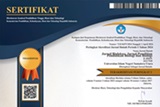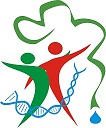Statistical knowledge of biology education students in Malang
Abstract
Statistical knowledge is a basic competency which must be possessed by Biology Education students before conducting research. Unfortunately, Statistics is often considered a difficult subject by biology students. The purpose of this survey research was to explore the statistical knowledge of Biology Education students. A total of 40 students in the Universitas Muhammadiyah Malang were involved in this research. The data were collected using a questionnaire containing 12 statements. Descriptive statistics was used to analyze the research data. The results showed that the mean score of students' statistical knowledge was 77.92 ± 17.96; meanwhile, 52.5% of students’ knowledge was categorized as good. In addition, the accuracy of student answers on several items reached over 90%, even though there were also items in which the answers were only 50% accurate. Therefore, innovation in Statistics lecture needs to be carried out to optimize the empowerment of statistical knowledge for Biology Education students.
Keywords
Full Text:
PDFReferences
Alomir, A. M. (2016). The experience of teaching statistics to non-specialist students in Saudi universities [Dissertation]. University of Glasgow.
Arifin, S., & Aprisal, A. (2020). Analisis tingkat pemahaman konsep statistika mahasiswa calon guru menggunakan two tier test berbasis online. Delta: Jurnal Ilmiah Pendidikan Matematika, 8(2), 201–208. https://doi.org/10.31941/delta.v8i2.1059
Azis, & Nurlita, M. (2018). Analisis kemampuan pemahaman pengetahuan mahasiswa pada mata kuliah Statistik Matematika. Jurnal Akademik Pendidikan Matematika FKIP Unidayan, 4(2), 46–56. https://doi.org/10.17605/OSF.IO/JPZ2F
Barbera, J., Naibert, N., Komperda, R., & Pentecost, T. C. (2021). Clarity on Cronbach’s Alpha use. Journal of Chemical Education, 98(2), 257–258. https://doi.org/10.1021/acs.jchemed.0c00183
Begum, K. J., & Ahmed, A. (2015). The importance of statistical tools in research work. International Journal of Scientific and Innovative Mathematical Research, 3(12), 50–58.
Burhan. (2013). Kemampuan analisis statistik inferensial mahasiswa STAIN Sultan Qaimuddin Kendari berbasis gender. Al-Izzah, 8(2), 78–91.
Burke, D. A., Whittemore, S. R., & Magnuson, D. S. K. (2013). Consequences of common data analysis inaccuracies in CNS trauma injury basic research. Journal of Neurotrauma, 30(10), 797–805. https://doi.org/10.1089/neu.2012.2704
Cimpoeru, S., & Roman, M. (2017). Statistical literacy and attitudes towards statistics of Romanian undergraduate students. The 11th International Conference of Applied Statistics.
Fatmawati, D., & Fauzi, A. (2019). Statistics mastering profile of students in biology education study program. Unnes Science Education Journal, 8(1), 69–75. https://doi.org/10.15294/usej.v8i1.29381
Fauzi, A., & Fariantika, A. (2018). Courses perceived difficult by undergraduate students majoring in biology. Biosfer: Jurnal Pendidikan Biologi, 11(2), 78–89. https://doi.org/10.21009/biosferjpb.v11n2.78-89
Fauzi, A., & Pradipta, I. W. (2018). Research methods and data analysis techniques in education articles published by Indonesian biology educational journals. JPBI (Jurnal Pendidikan Biologi Indonesia), 4(2), 123–134. https://doi.org/10.22219/jpbi.v4i2.5889
Gogtay, N. J., & Thatte, U. M. (2017). Common statistical errors and how to avoid them. Journal of Association of Physicians of India, 65, 81–84.
Jatisunda, M. G., Nahdi, D. S., & Suciawati, V. (2020). Kemampuan literasi statistika mahasiswa Adminitrasi Publik. SJME (Supremum Journal of Mathematics Education), 4(2), 134–146. https://doi.org/10.35706/sjme.v4i2.3488
Lai, G., Tanner, J., & Stevens, D. (2011). The importance of mathematics competency in statistical literacy. Advances in Business Research, 2(1), 115–124. https://doi.org/10.1109/TPAMI.2006.18
Leavy, A. M., Hannigan, A., & Fitzmaurice, O. (2013). If you’re doubting yourself then, what’s the fun in that? An exploration of why prospective secondary mathematics teachers perceive statistics as difficult. Journal of Statistics Education, 21(3). https://doi.org/10.1080/10691898.2013.11889684
Lukman, & Wahyudin. (2020). Statistical literacy of undergraduate students in Indonesia: survey studies. Journal of Physics: Conference Series, 1521(3), 032050. https://doi.org/10.1088/1742-6596/1521/3/032050
Macher, D., Paechter, M., Papousek, I., Ruggeri, K., Freudenthaler, H. H., & Arendasy, M. (2013). Statistics anxiety, state anxiety during an examination, and academic achievement. British Journal of Educational Psychology, 83(4), 535–549. https://doi.org/10.1111/j.2044-8279.2012.02081.x
Mao, P., Cai, Z., He, J., Chen, X., & Fan, X. (2021). The relationship between attitude toward science and academic achievement in science: A three-level meta-analysis. Frontiers in Psychology, 12. https://doi.org/10.3389/fpsyg.2021.784068
Ncube, B., & Moroke, N. D. (2015). Students’ perceptions and attitudes towards statistics in South African university: An exploratory factor analysis approach. Journal of Governance and Regulation, 4(3), 231–240. https://doi.org/10.22495/jgr_v4_i3_c2_p5
Oster, R. A., & Enders, F. T. (2018). The importance of statistical competencies for medical research learners. Journal of Statistics Education, 26(2), 137–142. https://doi.org/10.1080/10691898.2018.1484674
Rafiu, J. A. (2020). The effect of attitude on student’s academic performance in Cataloguing and Classification Course in Nigerian Polytechnics. Proceedings of the 2020 The 3rd International Conference on Information Science and System, 198–203. https://doi.org/10.1145/3388176.3388182
Ramirez, C., Schau, C., & Emmioǧlu, E. (2012). The importance of attitudes in statistics education. Statistics Education Research Journal, 11(2), 57–71. https://doi.org/10.52041/serj.v11i2.329
Ririen, D. (2019). Pengaruh pengetahuan awal dan persepsi mahasiswa terhadap prestasi belajar statistika II di STIE Indragiri Rengat. Jurnal Manajemen Dan Bisnis, 8(1), 49–60. https://doi.org/10.34006/jmbi.v8i1.67
Sendef, J., & Robbins, A. (2019). How scientists use statistics, samples, and probability to answer research questions. Frontiers for Young Minds, 7. https://doi.org/10.3389/frym.2019.00118
Sölpük, N. (2017). The effect of attitude on student achievement. In E. Karadag (Ed.), The Factors Effecting Student Achievement (57–73). Springer International Publishing. https://doi.org/10.1007/978-3-319-56083-0_4
Susetyarini, E., & Fauzi, A. (2020). Trend of critical thinking skill researches in biology education journals across Indonesia: From research design to data analysis. International Journal of Instruction, 13(1), 535–550. https://doi.org/10.29333/iji.2020.13135a
Taber, K. S. (2018). The use of Cronbach’s Alpha when developing and reporting research instruments in science education. Research in Science Education, 48(6), 1273–1296. https://doi.org/10.1007/s11165-016-9602-2
Tishkovskaya, S., & Lancaster, G. A. (2010). Identified problems in teaching and learning statistics: Review and implementation. International Conference on Teaching Statistics Proceedings, 8, 2–5.
Wu, S. & He, J. (2011). Misuse of statistical methods in 10 leading chinese medical journals in 1998 and 2008. The Scientific World Journal, 11, 2106–2114. https://doi.org/10.1100/2011/139494
Yuniawatika. (2018). Statistical literacy and its urgency for students. Advances in Social Science, Education and Humanities Research, 269(CoEMA), 170–173.
Zhang, Y. & Su, H. (2012). Attitudes toward statistics in medical postgraduates: measuring, evaluating and monitoring. BMC Medical Education, 12(1), 117. https://doi.org/10.1186/1472-6920-12-117
DOI: http://dx.doi.org/10.30821/biolokus.v5i2.1321
Refbacks
- There are currently no refbacks.
Copyright (c) 2023 Jurnal Biolokus: Jurnal Penelitian Pendidikan Biologi dan Biologi
indexed by :












